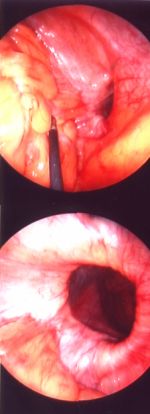
Hernia (Inguinal Hernia)
A hernia is a protrusion of tissue or organ through membrane (usually muscle) that surrounds and holds the tissue or organ. The most common type of hernia is inguinal hernia where a small piece of intestine protrudes through a hole in the groin muscle creating a bulge or hernial sac of intestinal tissue.
Hernia is one of the most common conditions leading to corrective surgery. Surgery is also the only medical treatment for hernias. Men are affected by inguinal hernia more often than women due to their anatomy. Hernias can be congenital or acquired. A congenital hernia is due to incomplete closure of the abdominal wall, while acquired hernias are due to weakness and failure of the connective tissue in the membrane surrounding and holding an organ.
Acquired hernias are caused by strong pressure in the affected region, especially the abdomen. This could be due to chronic coughing, pressing too strongly during bowel movements, or improper technique while lifting heavy loads straining the abdominal muscles.
Complications include trapping part of the intestine (strangulated intestine) reducing or entirely cutting off blood supply causing the cells to die. This potential fatal condition can only be treated by manually reinserting (termed “reducing”) the herniated tissue or organ during surgery. In extreme cases, part of the trapped tissue or organ must be removed. This is an incarcerated hernia, when part of the trapped tissue or organ has died and no longer functions. The progression of hernia is unpredictable and independent of the size of the trapped tissue or organ. Small hernias tend to be more dangerous than larger ones.
Men are more common
affected than women
Palpable, visible bulging of the abdominal wall in the groin area
Conservative treatment
or surgery
Symptoms
In most cases, a visible sack like protrusion can be seen in the abdominal wall that bulges during coughing or pressing. Pain increases while sitting, coughing, lifting or pressing abdominal muscles. The first sign can be a painful tearing sensation in the abdomen or groin. Sever inguinal hernias can stretch down to the scrotum (scrotal hernia). Sever cramps and vomiting plus absence of bowel movement may be an indication of obstructed hernia.
Therapy
Non-surgical attempts to cure hernia are nearly always futile. Using a corset, truss, belt or other external devise can actually increase the damage of a hernia. The only certain method of treating hernia is surgery.
Operation
Surgical therapy is the only method of curing a hernia. This is especially true for strangulated hernia or obstructed hernia. The sack-like tissue or organ must be manually reinserted (reduced) into the abdomen, the hole repaired and the muscle or membrane reinforced with a prosthetic mesh. In some cases a relapse may occur if there is congenital weakness of the connective tissue, in which case the same surgical procedure must be repeated. There are several surgical procedures used to treat hernia. They all require general or local anesthesia.
Minimal Invasive surgical Methods Laparoscopic hernia repair (TAPP or Transabdominal preperitoneal)
Conventional Invasive procedures open Hernia repair: Open surgery without mesh (Shouldice repair or Canadian operation)
Open Hernia repair: Open surgery using prosthetic mesh (Lichtenstein repair or tension-free repair)
Testimonial from a patient:
Very nice place, I had nice experience there with operation and the doctor is very careful and taking good care after my surgery.
Source: Google

Prognosis
Hernia surgeries are one of the most common surgeries performed. A second operation is more difficult than the first and results in more complications due to previous scarring. The patient can begin using the groin muscle 7-10 days after the laparoscopic method or 8-12 weeks after one of the open surgery methods. Patients are usually released from the hospital after 1-2 days and are usually able to work again within 7-10 days.
A reoccurrence is possible if the abdominal muscles are strained too much through heavy coughing, heavy lifting or overactive athletic activities. Obesity can also lead to a reoccurrence of hernia. Hernia relapse is most common within 2 years after a successful hernia operation.
Notice: Preoperative preparation: Please inform your physician if you are taking blood thinning medication such as Aspirin® and Marcumar® as they may lead to complications during surgery.
Your health is
important to us
Office Hours
Monday, Tuesday, Wednesday: 8:30 – 16:00
Thursday: 8:30 – 18:00
Friday: 8:30 – 13:00
and by appointment

